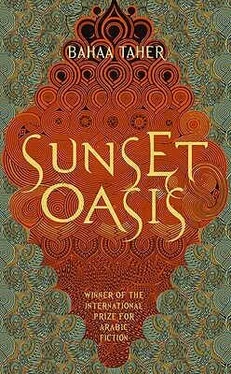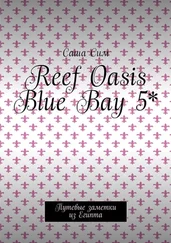Bahaa Taher - Sunset Oasis
Здесь есть возможность читать онлайн «Bahaa Taher - Sunset Oasis» весь текст электронной книги совершенно бесплатно (целиком полную версию без сокращений). В некоторых случаях можно слушать аудио, скачать через торрент в формате fb2 и присутствует краткое содержание. Год выпуска: 2009, Издательство: Sceptre, Жанр: Современная проза, на английском языке. Описание произведения, (предисловие) а так же отзывы посетителей доступны на портале библиотеки ЛибКат.
- Название:Sunset Oasis
- Автор:
- Издательство:Sceptre
- Жанр:
- Год:2009
- ISBN:нет данных
- Рейтинг книги:3 / 5. Голосов: 1
-
Избранное:Добавить в избранное
- Отзывы:
-
Ваша оценка:
- 60
- 1
- 2
- 3
- 4
- 5
Sunset Oasis: краткое содержание, описание и аннотация
Предлагаем к чтению аннотацию, описание, краткое содержание или предисловие (зависит от того, что написал сам автор книги «Sunset Oasis»). Если вы не нашли необходимую информацию о книге — напишите в комментариях, мы постараемся отыскать её.
Sunset Oasis — читать онлайн бесплатно полную книгу (весь текст) целиком
Ниже представлен текст книги, разбитый по страницам. Система сохранения места последней прочитанной страницы, позволяет с удобством читать онлайн бесплатно книгу «Sunset Oasis», без необходимости каждый раз заново искать на чём Вы остановились. Поставьте закладку, и сможете в любой момент перейти на страницу, на которой закончили чтение.
Интервал:
Закладка:
Each one succeeded the next without causing me any anxiety or self-reproach, as though it were very natural that I should get drunk, attend the Masonic lodge, sleep with women, go to Afghani's gatherings, and turn with my father and the Sufis in the circle of remembrance. I even thought in those days that I ought to pay some attention to my studies, so as to obtain a diploma and enter the College of Law, as most students dreamt of doing. I believed I would have been well suited to that because what most caught my fancy at school were the classes in rhetoric and literature. My father, however, went bankrupt. A Greek merchant seduced him with promises of large profits from the import of olive oil from his country, then inveigled him into debt, and interest on the debt, until in the end the Muski shop was wrested from him. No source of income remained to support the large house full of slave girls and servants. My father made a great effort to have me enrolled in the police, and it was possible at that time for me to become an officer with the education I had acquired and some months of training. Thus my father was able, before his sorrows and illnesses incapacitated him, to set his mind at rest, knowing that my salary would be enough to support my mother and brother and keep the house open, albeit without the feasts and the singing and the circles of remembrance. The visitors disappeared and, along with them, even the Sufis and the singers of religious songs. I returned to the circles only once, after many years, when Brigadier General Saeed invited me to a night of chanting with the Sufi order to which he belonged, but I never repeated the experience. It failed to inspire any of the ecstasy that had swept over me in the long-gone past.
And now I ask myself- has all that distant past disappeared? I ask whether the parts of that young man, with his divided spirit, have come together, or whether the days have flung them farther apart. When I married Catherine, after much hesitation, I dreamt that my unruly self might finally calm down. A family, a house, an intelligent and courageous wife — why did that settledness never come? Why does it remain elusive and out of reach? The only certain thing is this uniform that I wear, and this profession that came to me without my wanting it and than which I have known no other, despite all the vicissitudes of the years.
And now this oasis.
2. Catherine
I know Mahmoud will miss this roomy house. In the silence of the desert he'll yearn for this quarter where people are in constant motion and the cries of the street vendors never cease. Of course, he won't miss the Khedive's palace next door to us, where our feet have never trod, though I have become fond of what can be seen over the walls of its beautiful green gardens. Mahmoud can't imagine life far from his house, which is the only one he's ever known. I, on the other hand, have moved three times and no one house fills me with a sense of nostalgia. Places come back to me only when I think of the people who live in them, and then I recall even their familiar smells and forgotten corners, and am astonished by the games memory plays.
Mahmoud is a little late. He went to the ministry to complete the formalities and said he'd come back afterwards to help me pack. Not much is left to do; everything is ready for the journey except Mahmoud himself. I long ago got used to his endless changes of mood. He used to astonish me at first when he'd say one thing and then its opposite, or do contradictory things with no forewarning. This time, though, things are different. His sorrow is deepening.
He wasn't happy when I met him, and nor was I then. Nevertheless, we managed to seize happiness, and we lived it for a while. I always see him as I saw him for the first time, on the bridge of the dahabiya where chance threw us together on the trip to Aswan. I noticed him standing there, with his towering stature, wearing his police uniform and tarboosh, from beneath which the grey hair, framing his youthful face, protruded. His handsome features caught my attention immediately, but it wasn't them which attracted me to him. From the beginning I found him different from the other officers I had met in Cairo, different in fact from all the men I had met here. These usually spoke to me, as a foreigner and a British woman in a country occupied by the British, with total subservience, while looks of supplicant lust flowed from their eyes like beggars' tears. When I approached him, his tarboosh looked to me like a pharaonic crown on his head, his stern face with its wide black eyes and regular features the face of a real king transferred from the walls of a temple to the deck of that dahabiya. I asked him how much time remained before we reached Aswan. He didn't turn towards me, eyes lowered, like the others. On the contrary, I noticed a fleeting look of hostility in them. He looked around him, however; there was nothing on the horizon except fields on either side of the river and identical villages at the ends of the fields. Then he looked into my eyes and said, in what was in those days his poor English, 'I don't know. I am here with the guard of the dahabiya.' He was a member of the guard of, as far as I remember, some travelling prince or minister, and when I remained standing in front of him, he said, unenthusiastically, that he could ask one of the sailors if I liked. So I said, 'I'll come with you.'
From then on I stayed with him — on the dahabiya on the Nile, in the streets of Aswan, in the temples of Luxor, and then in Cairo, where we got married. For a long time he was hesitant in his approaches to me and I was the one who did most of the talking. I think the turning point came when he found out I was Irish and I hated the British for occupying my country, as they had occupied his, and felt shame at bearing their nationality, which I would be rid of the day Ireland gained its independence. After this, the barriers between us collapsed. His resistance, which I could see in his eyes just as I could the love, came to an end. Or was I deluding myself?
Was it love or desire? It didn't make much difference to me at the time and he warned me at the start of our relationship that he had promised himself never to get married, though that promise did not hold for long.
The sheikh who notarized our nuptials in Cairo seemed miserable to see a Muslim man, and a respectable officer, marrying a foreign woman not of his religion. He'd ask a question and the alarm in his eyes would grow yet greater and he'd repeat the answer as though he couldn't believe his ears. She's not a virgin? A widow? Two years older than he? There was no father or brother to act as her proxy for the marriage contract? She was giving herself away?
Mahmoud told me that there was nothing in all that which contradicted their religious law, but I saw the notary bury his face in his papers and record in them what he heard without raising his head, so that we shouldn't see the look of indignation in his eyes. He was, however, the epitome of politeness compared to the British when I went to the consulate to register my marriage. You're marrying an Egyptian? And according to their laws too? And before coming to us? Are you aware of the rights you have lost? I responded in like fashion. I told them their law appealed to me more than that of the British in Ireland. My marriage had at least taken place of my own free will and no one had imposed it on me by force. When they heard this they rushed through the formalities, so. that I wouldn't stay long at the consulate.
Mahmoud didn't expect the British advisor at the ministry to agree to my travelling with him to the oasis. I think he agreed with the greatest of pleasure, in the hope that I'd perish there as quickly as possible!
During our first days, our first months, I knew with Mahmoud a happiness that I didn't think possible in this world, after my wretched experience with Michael. And from the beginning I discovered that Mahmoud could not tolerate any talk of love — he didn't speak of it himself and he didn't want to hear it. Love, for him, was lovemaking, no more, no less. He was a king in that too. Ever ready to give, always able to awaken my passions, and bringing a knowledge gained through numerous experiences dating from his youth and which he didn't seek to deny. I learnt through my instincts alone — the instincts that I'd forgotten with Michael — to keep pace with his greater knowledge. And I may have taught him something myself too. I made him understand that I didn't like the violence and ravishment that he imagined were the marks of manliness, that I liked soft touches and for the two bodies to respond together slowly and fluidly, moving from the pleasure of closeness and caresses to the peak of ecstasy and fulfilment.
Читать дальшеИнтервал:
Закладка:
Похожие книги на «Sunset Oasis»
Представляем Вашему вниманию похожие книги на «Sunset Oasis» списком для выбора. Мы отобрали схожую по названию и смыслу литературу в надежде предоставить читателям больше вариантов отыскать новые, интересные, ещё непрочитанные произведения.
Обсуждение, отзывы о книге «Sunset Oasis» и просто собственные мнения читателей. Оставьте ваши комментарии, напишите, что Вы думаете о произведении, его смысле или главных героях. Укажите что конкретно понравилось, а что нет, и почему Вы так считаете.












